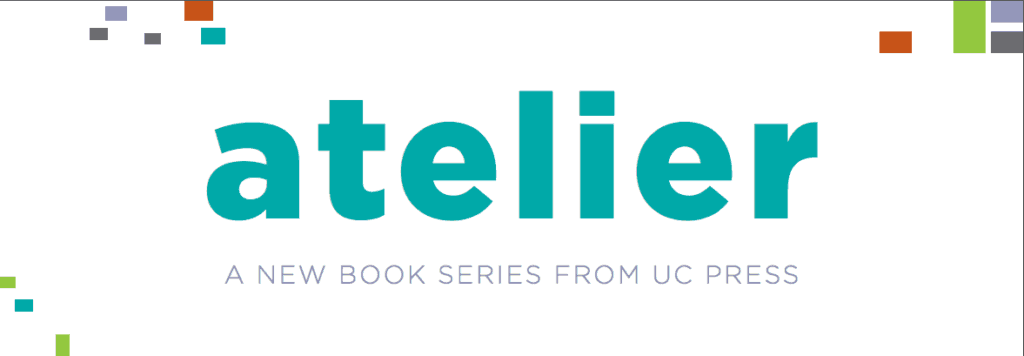Edited by Kevin Lewis O’Neill, Atelier is a book series in anthropology that takes a ground-up approach to the acquisition and publication of new ethnographic works. Curating a cohort of scholars committed to the idea that ethnographic writing is itself a form of intellectual work, Atelier enables collaboration at each stage of a book’s development, from the earliest draft through publication, with constructive engagement from peers and publishers.
We are proud to announce our 2023 Atelier authors!
Emma Crane Shaw, Columbia University
Counterinsurgent Suburb
Counterinsurgent Suburb argues that the United States makes war not just through spectacular acts of violence abroad but also through practices of care and remediation in such U.S. suburbs as Homestead, the ethnographic focus of this book. At Miami’s southern edge, Homestead hosts a military base and a detention camp for migrant children while Indigenous Maya labor across punitively policed terrain. Amid some of empire’s deepest contradictions, Homestead and other suburbs are both a crucial node in global circuits of war-making and a site of confinement, injury, and precarious refuge.
Samuel Shearer, Washington University in St. Louis
The Kigali After
The Kigali After is an ethnography of a city in Rwanda that is being destroyed so it can be rebuilt for the end of the world. It is about popular cultures and street economies where there is no public space; the production and defense of popular urbanism where the government has zero tolerance for “disorder”; and the manufacture of ruined built environments in the service of a project that is called “sustainable urbanism.” The book follows these contradictions as they unfold during one of the twenty-first century’s most daring experiments in utopia and green capitalism: the Kigali City Master Plan.
Sharika Thiranagama, Stanford University
The Monster in Your Path
The Monster in Your Path: The Private Life of Caste examines the long life of caste stratification and humiliation in the South Indian state of Kerala, famous for its communist mobilization and comprehensive welfare state. It is structured around two major themes. Firstly, a consideration of profound social transformation with staggered emancipation, examining the contemporary legacies of deep enslavement of Dalit communities, the differentiated outcomes for these communities in contemporary Kerala, as well as the profound dignity and respect-making projects of ordinary Dalits. Secondly, it argues that while much political anthropology has focused on transforming public spaces and spheres as instruments of transformation, that new kinds of publics have created new kinds of privates. Through examining new privates, the house, the neighborhood, and the gendered self, the book argues that caste stratification, which has been nominally re-ordered in public, is sedimented and structures these new privates leading to its ongoing making of selves and spaces, in India.
Check out our 2023 Atelier books:
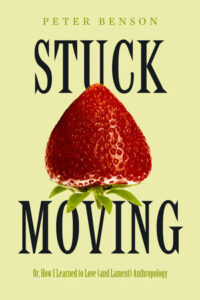
Stuck Moving:
Or, How I Learned to Love (and Lament) Anthropology
Stuck Moving follows a professor affected by bipolar disorder, drug addiction, and a stalled career who searches for meaning and purpose within a sanctimonious discipline and a society in shambles. It takes aim at the ableist conceit that anthropologists are outside observers studying a messy world. The lens of analysis is reversed to expose the backstage of academic work and life, and the unbecoming self behind scholarship. Blending cultural studies, psychoanalysis, comedy, screenwriting, music lyrics, and poetry, Stuck Moving abandons anthropology’s rigid genre conventions, suffocating solemnity, and enduring colonial model of extractive knowledge production. By satirizing the discipline’s function as a culture resource for global health and the neoliberal university, this book unsettles anthropology’s hopeful claims about its own role in social change.
Peter Benson is Professor of Anthropology at the University of Delaware. He is the author of Tobacco Capitalism and a coauthor of Broccoli and Desire.
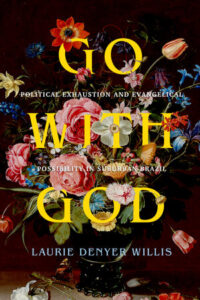
Go with God:
Political Exhaustion and Evangelical Possibility in Suburban Brazil
Through deep attention to sense and feeling, Go with God grapples with the centrality of Evangelical faith in Rio de Janeiro’s subúrbios, the city’s expansive and sprawling peripheral communities. Based on sensory ethnographic fieldwork and attuned to religious desire and manipulation, this book shows how Evangelical belief has changed the way people understand their lives in relation to Brazil’s history of violent racial differentiation and inequality. From expressions of otherworldly hope to political exhaustion, Go with God depicts Evangelical life as it is lived and explores where people turn to find grace, possibility, and a future.
Laurie Denyer Willis is Lecturer in Social Anthropology at the University of Edinburgh.
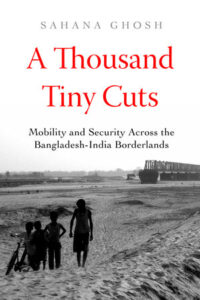
A Thousand Tiny Cuts:
Mobility and Security across the Bangladesh-India Borderlands
A Thousand Tiny Cuts chronicles the slow transformation of a connected region into national borderlands. Drawing on a decade of fieldwork in northern Bangladesh and eastern India, Sahana Ghosh shows the foundational place of gender and sexuality in the making and management of threat in relation to mobility. Rather than focusing solely on border fences and border crossings, she demonstrates that bordering reorders relations of value. The cost of militarization across this ostensibly “friendly” border is devaluation—of agrarian land and crops, of borderland youth undesirable as brides and grooms in their respective national hinterlands, of regional infrastructures now disconnected, and of social and physical geographies disordered by surveillance. Through a textured ethnography of the gendered political economy of mobility across postcolonial borderlands in South Asia, this ambitious book challenges anthropological understandings of the violence of bordering, migration and citizenship, and transnational inequalities that are based on Euro-American borders and security regimes.
Sahana Ghosh is Assistant Professor of Anthropology at the National University of Singapore.
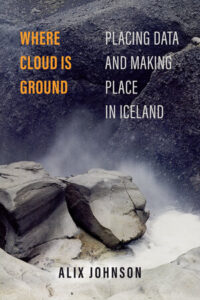
Where Cloud Is Ground:
Placing Data and Making Place in Iceland
Where Cloud Is Ground offers an ethnography of the international data storage industry and an inquiry into the relationship between data and place. Based in Iceland, which is fast becoming a hot spot for data centers—facilities where large quantities of data are processed and stored—the book traces the fraught work of siting data’s material manifestations in relation to landforms and earth processes, local politics, national narratives, and still-open questions of spatial justice and sovereignty. Doing so, it unsettles techno-utopian ideals of connectivity and offers a window into what it means to live with our data, in a place where more and more data now lives.
Alix Johnson is Assistant Professor of International Studies at Macalester College.
